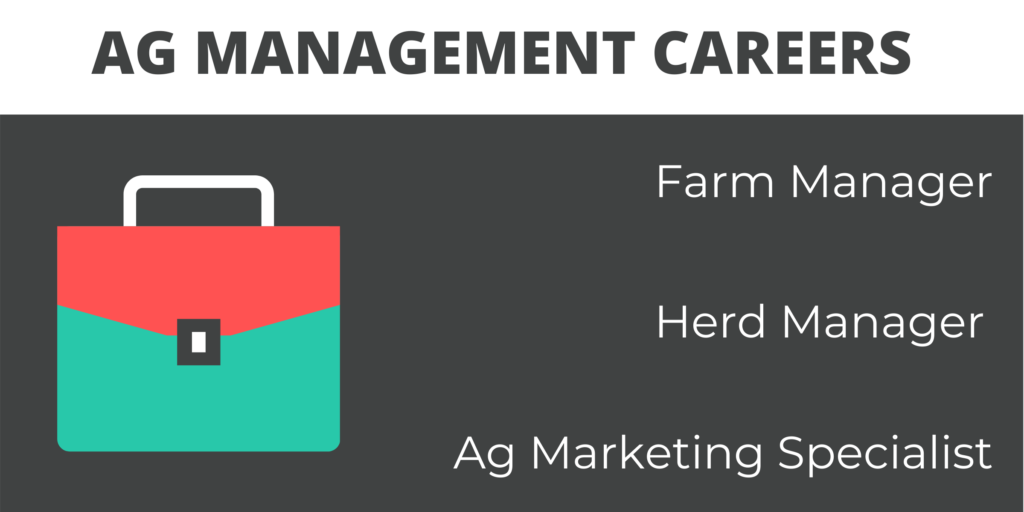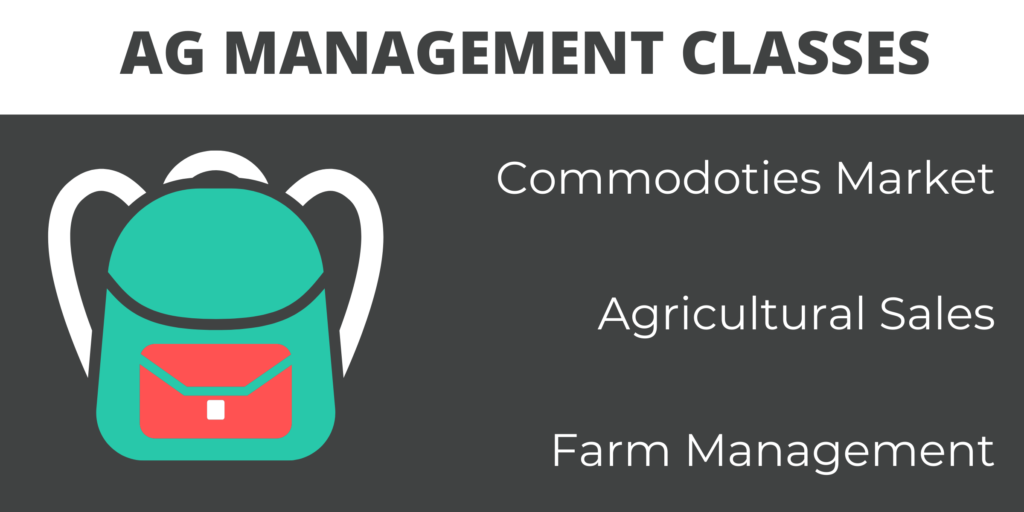Despite the high tech world we live in today, countless industries rely on rural farming and other agricultural operations. Because of this, large agriculture is big business–in most cases agriculture companies own and operate a variety of different farms, timber tracts, plant nurseries, greenhouses, and other operations. Companies then appoint qualified agricultural managers to oversee one or multiple of these operations.
The size and scope of an operation will confer the specialization and experience-level required of an agricultural manager to be successful. For this reason there is tremendous variation between professional specializations within agricultural management such as industrial crop-farming, environment engineering, and livestock production just to name a few.
Unfortunately, gone are the days of lone ranchers who run middle-size farms. Agriculture is becoming an increasingly corporate industry. This fact will be majorly appealing to some professionals and not appealing to others. Thankfully, the industry is large enough to incorporate individuals of either sentiment–those striving to increase corporate productivity and market value, and those who prefer the old way of family farming with a strictly local (or regional) focus.
Additional Resources on Agriculture Management:
- HIGHEST PAYING DEGREES IN AGRICULTURE – MAJORS AND CAREERS
- 50 TOP SCHOLARSHIPS FOR AGRICULTURE DEGREES
- WHAT CAN I DO WITH AN AGRICULTURE DEGREE?
- HOW DO I BECOME AN ORGANIC FARMER?
- WHAT DEGREE DO I NEED TO BE A SOIL SCIENTIST?
- WHAT IS THE BENEFIT OF AN INDUSTRIAL ENGINEERING DEGREE VS A SUPPLY CHAIN MANAGEMENT DEGREE?
- WHAT KINDS OF PERSONALITY TRAITS ARE BEST FOR A CAREER IN INDUSTRIAL AND LABOR RELATIONS?
- WHAT CAN I DO WITH AN INDUSTRIAL TECHNOLOGY DEGREE?
- WHAT DEGREE DO I NEED TO BE AN INDUSTRIAL HYGIENIST?
Sectors and Specializations of the Agriculture Industry

The agriculture industry is made up of many different sectors of business working in tandem. Agricultural managers will take on noticeably different roles and responsibilities depending on their chosen area of the market. Here’s a list of the primary sectors of the agriculture industry:
- Food and Beverage Manufacturing
- Food and Beverage Stores
- Food Services and Eating and Drinking Places
- Textiles
- Apparel
- Leather Products
- Forestry
- Fishing
Due to the vastly different business models and operational requirements of different sectors of agriculture management, it is exceedingly important for prospective professionals of the industry to build the necessary prerequisite experience and expertise. But don’t worry, in this guide we will cover the ins and outs of agricultural management–the most promising career outcomes and how to reach them.
Agriculture Industry in 2021 and Beyond

Any guide covering professional opportunities in the agriculture industry would be remiss to exclude a well-known but misleading fact concerning the industry–that is, the agriculture industry is in decline. From 2019 to 2029 the Bureau of Labor Statistics predicts a decline of around 6% in the job market when the national average represents a state of growth of around 4% to 5%. But this decline is misleading in at least a few ways.
First of all it reinforces this notion of the agriculture industry failing, which could not be further from the truth. While the industry is certainty undergoing change, there is no denying the irrevocable dependence of our economy on its agriculture operations. While agricultural imports do impact the market, we will always need a steady supply of domestic resources.
Secondly, the decline in the agriculture industry’s job market represents the removal of certain job opportunities–not all jobs. Unfortunately, it is the small family farming operations that are being bought out, closed down, or sold off piecemeal in assets sales. As smaller scale farming operations shut down, large agriculture corporations take on a larger share of the market, which while cutting the number of overall opportunities has also created new opportunities for expert professionals. The median salary of all agriculture professionals is around $70,000–making it a noticeably lucrative job market with above average salaries.
International Business and Agriculture Job Markets

According to data from the USDA, the overall market for agriculture is absolutely massive–with a $1.109 trillion contribution to the U.S. gross domestic product (GDP) in 2019, a figure representing a 5.2% share. Unfortunately, output of America’s farms contributed only about$136 billion of this sum—little more than 10% of the industry’s total contribution. In other words, agriculture is shifting more and more away from traditional models of agriculture that historically relied more on farming operations.
The evolution of the agriculture job market is further demonstrated by the shift of employment away from on-farm jobs to jobs related to the service industry. In 2019 the agriculture job market looked like the following:
- 22.2 million full-time and part-time jobs comprised the agricultural and food sectors of the job market.
- The agriculture job market accounts for 10.9% of total U.S. employment.
- On-farm employment however, accounted for only about 2.6 million of these jobs, or 1.3% of total U.S. employment.
- Employment in food-related industries offered a whopping 19.6 million jobs.
- Of these jobs, ‘food service, eating, and drinking’ accounted for the largest share of the job market—13.0 million jobs— while ‘food & beverage stores’ offered 3.2 million jobs.
- The remaining agriculture-related industries together added another 3.4 million jobs.
From this we can see that the most solid area of the agriculture job market is the sector related to food industries. With this in mind, savvy professionals can further specialize to target on-demand positions within niche areas of the industry’s food-agriculture sector-overlap where employment opportunities are abundant and compensation packages are seductive.
Why Earn a Degree in Agricultural Management?

Earning a degree in Agriculture Management is the ideal method for positioning one’s self to capitalize on market needs. For instance, farm-to-table is one of the most popular sectors within the agriculture-food-related sector. Professions can position themselves to work in this explosive industry by earning a agricultural management degree with a specialization that confers expertise in the ‘farm to table’ dynamic.
In other words, earning a agricultural management degree allows professionals to establish a competitive edge for entering the job market. As mentioned in the introduction though, establishing an expertise is crucial for capitalizing on the unique demands of specialized managerial roles. And specialized managerial roles represent the most lucrative opportunities on the job market.
Many agriculture management degree programs offer specialized degree tracks, course concentrations, and professional opportunities to position students to build on-demand specializations.
Agriculture, Environmental Science, and Agribusiness

Agriculture and environmental science are fundamentally connected. Technically, agriculture is a subcategory of environmental science, which is defined as the interdisciplinary collaboration between physical, biological and information sciences to solve environmental problems. In other words, all forms of agriculture involve environmental science but not all environmental science involves agriculture.
Agricultural environmental science refers to the area of the industry concerned with food production, food security, and the logistics-end of food distribution. Agricultural environmental science does tackle other concerns as well, but food-related industries make up the largest area of overlap between the two sciences.
Agribusiness on the other hand focuses exclusively on the business-interests of agriculture and environmental science. Agribusiness professionals work with manufacturing plants, logistics companies, and food service companies. In other words, they work more closely with industrial operations more than farming operations.
Additional Resources on Environmental Science:
- WHAT’S A TYPICAL WORKDAY FOR SOMEONE IN THE FIELD OF ENVIRONMENTAL HEALTH AND SAFETY MANAGEMENT?
- WHAT ARE THE HIGHEST PAYING JOBS IN ENVIRONMENTAL SCIENCE?
- WHAT IS THE DIFFERENCE BETWEEN A DEGREE IN ENVIRONMENTAL SCIENCE AND ENVIRONMENTAL ENGINEERING?
- WHAT’S A TYPICAL WORKDAY FOR SOMEONE IN THE FIELD OF ENVIRONMENTAL HEALTH AND SAFETY MANAGEMENT?
- HOW ADVANCED A DEGREE DO I NEED FOR A CAREER IN ENVIRONMENTAL SCIENCE?
- WHAT IS THE WAGE POTENTIAL WITH A DEGREE IN ENVIRONMENTAL SCIENCE?
- WHAT CAN I DO WITH AN ENVIRONMENTAL ENGINEERING DEGREE?
- WHAT’S A TYPICAL WORKDAY FOR SOMEONE IN THE FIELD OF ENVIRONMENTAL HEALTH AND SAFETY MANAGEMENT?
Agriculture Education Programs

Agriculture Management represents an advanced area of the job market which requires professionals to demonstrate both industry-specific expertise and aptitude as a manager. For this reason, agriculture management is a profession that requires some higher learning at the level of associate’s or bachelor’s education, or even graduate-level education for more high-end positions.
Here’s a breakdown of some of the educational paths to agriculture management:
Associate’s
- Agricultural Marketing
- Livestock &Beef Production
- Farming Economics
- Horticulture
- Soil Conservation
Bachelor’s
- Farm Planning
- Business Statistics
- Business Management
- Market Analytics
- Product Marketing
Master’s
- Agribusiness Marketing
- Industrial Farming
- Economic Risk Analysis
- Industrial Manufacturing
- Fiscal Management
- International Trade
- Production Economics
Popular Careers
- Agricultural Products Inspector
- Livestock-Feed Service Representative
- Food-Processing Manager
- Soil Conservation Analyst
- Agriculture Product Sales Manager
Additional Resources on Agriculture Education:
- WHAT CLASSES WILL I HAVE TO TAKE FOR A DEGREE IN ENVIRONMENTAL ENGINEERING?
- WHAT CLASSES WILL I TAKE IN A BACHELOR’S DEGREE IN ENVIRONMENTAL DESIGN?
- WHAT DEGREE DO I NEED TO BE AN ENVIRONMENTAL GRAPHIC DESIGNER?
- WHAT DEGREE DO I NEED TO BECOME AN ENVIRONMENTAL ENGINEER?
- WHAT IS A BACHELOR’S DEGREE IN ENVIRONMENTAL ENGINEERING?
- WHAT IS A BACHELOR’S DEGREE IN ENVIRONMENTAL SCIENCE?
- WHAT IS A BACHELOR’S DEGREE IN ENVIRONMENTAL STUDIES?
- WHAT IS A DEGREE IN ENVIRONMENTAL DESIGN?
- WHAT IS A DEGREE IN ENVIRONMENTAL NUTRITION?
- WHAT IS ENVIRONMENTAL SCIENCE?
- WHAT IS THE BENEFIT OF A CIVIL ENGINEERING DEGREE VS AN ENVIRONMENTAL ENGINEERING DEGREE?
- TOP 10 ONLINE BACHELOR’S DEGREE PROGRAMS IN ENVIRONMENTAL SCIENCE
- WHAT CAN I DO WITH AN ENVIRONMENTAL STUDIES DEGREE?
- HOW FAST CAN I EARN A MASTER’S DEGREE IN ENVIRONMENTAL SCIENCE?
- HOW MUCH SCIENCE IS IN AN ENVIRONMENTAL ENGINEERING DEGREE?
- WHAT ARE THE 5 BEST CAREERS IN ENVIRONMENTAL SCIENCE?
- WHAT ARE THE DIFFERENCES BETWEEN A BACHELOR’S & MASTER’S DEGREE IN ENVIRONMENTAL SCIENCE?
- WHAT ARE THE FASTEST SCHOOLS FOR A MASTER’S DEGREE IN ENVIRONMENTAL ENGINEERING?
6 Growing Jobs in Agriculture

Because the agriculture industry’s job market is shrinking overall, the areas of growth within the industry are all the more important. Especially when considering the time and money involved in attaining a degree, graduates need the confidence that their jobs will still be around by the time they complete their degree program. So with that in mind, here’s a breakdown of some of the fastest growing areas of the job market:
- Animal Breeding
Projected Job Growth: 39.6%
As industrial farming becomes hyper-focused on productivity and efficiency, there is an increasing demand for agriculture professionals who specialize in breeding the ideal animal for specific needs of the market. Given the stigma of consumers against genetic engineering, animal breeders use traditional look to create new breeds of livestock or to finetune the breeding process for existing breeds of high value.
- Agriculture Equipment Sales
Projected Job Growth: 30%
Agriculture is a business that is entirely dependent on large equipment for efficient and productive operation. The selling, maintaining, and repairing of this equipment is big business, and the sales teams in charge of selling industrial agriculture equipment make some great salaries. This job market is growing so rapidly because more and more equipment is developed to aid in industrial agriculture every year, and so there is a growing need for agribusiness sales professionals to represent these products on the market.
- Food Science Technologist
Projected Job Growth: 26.4%
Food Science and Technology is the area of the agriculture industry that develops new kinds of food, food production technology, as well as food storage and distribution equipment. Americans are always hungry for innovative foods and snacks, and food-science technologists work to fulfill this desire. This profession is defined by an array of research, technology development, and livestock operation and food manufacturing.
- Agricultural Engineer
Projected Job Growth: 17.2%
Agriculture Engineers are the professionals concerned with developing agriculture operations to enhance efficiency, productivity, and safety. From the physical structures and design of the farm itself, to the ordering and positioning of large industrial equipment, to designing multi-staged production lines–agriculture engineers are masters of fine-tuning farming operations at every level.
- Agricultural Finance
Projected Job Growth: 15%
With the agriculture business representing such a large portion of the American economy, agriculture finance professionals are tasked with ensuring the financial viability of agribusiness operations. These professionals incorporate expert knowledge of the agriculture industry with an in-depth knowledge of finance and accounting. These professionals help companies navigate financial decision-making at every level of agribusiness.
- Environmental Scientist
Projected Job Growth: 10%
Environmental scientists are the professionals who employ an interdisciplinary skillset to inform agricultural business operations. From soil science, to livestock breeding, to conducting market research–environmental scientists are always working to improve the science behind agricultural business. These scientists conduct large-scale studies to identify high value variables of farming and manufacturing that can be improved in one way or another.
6 Lucrative Jobs in Agriculture
Because there is some relative risk associated with working within a job market that is projected to shrink, finding appropriately gainful employment is all the more important. While employment rates may be shrinking within the agriculture industry overall, certain areas of the market have demonstrated explosive financial growth–particularly those that have been able to incorporate the value of industries like logistics and data science.
The salaries listed below are not necessarily representative of what an agricultural management degree will land you, however the degree will function as an excellent starting point for working up to them. Similarly, these salaries represent upper-end salaries–specifically those earned by professionals in the 75th percentile of salaries (figures have been sourced from the Bureau of Labor Statistics).
- Scientific Research and Development Services
75th Percentile Salaries: $169,830
Agricultural Scientists who work at the top-end of their field conduct industry-shaping research that informs industrial farming operations, manufacturing, and logistics. To reach the upper echelons of this profession, scientists must specialize in a certain area and build a portfolio of research and experimentation with that speciality.
Food science, livestock health, and genetic engineering are hot-button areas of research that can help catapult one’s career as an expert agricultural science researcher. An agricultural management degree will likely not be sufficient preparation for the level of expert knowledge and skill expected of these scientists, so with that in mind prospective professionals should consider an additional advanced degree in a specific science.
- Agricultural Purchasing Manager
75th Percentile Salaries: $149,960
Agribusiness operations that oversee multiple farms or utilize manufacturing lines rely on tremendous and diverse equipment catalogues. Purchasing managers are the professionals tasked with overseeing an agribusiness organization’s equipment catalogue to ensure budgets are effectively managed and purchases are effectively completed.
When a single equipment purchase can rank up in the millions, the high salaries for this line of work is clearly justified. Professionals interested in this line of work should start building familiarity with high-demand equipment, brands, pricing, etc. as well as budgeting, accounting, and negotiating. A degree program that offers a agricultural management degree would be ideal for this line of work.
- Industrial Production Manager
75th Percentile Salaries: $130,000
Industrial Production Managers are in charge of agricultural operations that rely on multi-stage production lines. For instance, an industrial production manager might oversee the bottling of milk at a dairy plant, the processing of chicken, or processing of other agricultural products.
These professionals often oversee large teams of production professionals as well as direct logistics connected to the production and manufacturing process. Professionals interested in this line of work should build experience working at different levels of agriculture production, and look to take on positions of management. The best degree path would be an agricultural management program with a specialization in production management, or manufacturing.
- Agricultural Geoscientists
75th Percentile Salaries: $128,580
These professionals often act as consultants for large industrial agriculture operations–directing construction and organization to match the demands of the land. Farming operations are usually positioned across massive lots of acreage, and agricultural geoscientists help ensure that the land is safe and sustainable.
The role of these scientists is even more valued in agricultural operations that rely on high-value crops. Geoscientists conduct research in order to evaluate the best farming approaches for specific crops–how to improve yield and health of the crop. An agricultural management degree with a specialization in geoscience would be an excellent way to jumpstart this career.
- Transportation, Storage, and Distribution Manager
75th Percentile Salaries: $124,750
Agribusiness relies on international supply chains to import supplies such as fertilizers and to export agriculture products. The management professionals at the top of the food chain in this line of work direct and oversee a massive network of transporters, distributors, and storage professionals.
In order to do so these professionals work with the latest and greatest logistics software, however there is also a tremendous amount of skill and experiential knowledge involved. Professionals interested in this line of work should build experience working in logistics, preferably as a manager. Earning a degree in agricultural management with a degree in logistics or supply chain management would be ideal.
- Grain and Oilseed Milling
75th Percentile Salaries: $110,000
One area of traditional crop farming that demonstrates continued profitability and security in the job market is grain and oilseed milling. Grains and oilseeds are two crops that are used in a wide array of products and industries. Agriculture managers who specialize in the growing, milling, and storing of this crop can bring home some amazing salaries.
To find work in this area, professionals should establish a history in working on farms and harvesting crops–specifically grains, seeds, or flowers. After building a foundation, professionals should look to take on managerial positions. An Agricultural Management Degree would also work well, though a specialization in milling would be ideal.
Carrie Morris
Author
Warren Dahl
Editor-in-Chief

